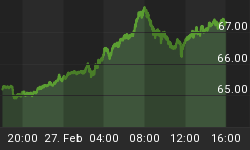We all should be painfully aware by now that there is nothing held inside the Social Security and Medicare trust funds but a bunch of IOUs. Monies collected from payroll taxes are treated as general revenues and used in the "unified budget." But how many of us are aware that the FDIC's Deposit Insurance Fund works in a similar fashion?
On March 2nd, FDIC Chairman Sheila Bair made some remarkable statements in defense of the Insurance Corporation's decision to raise fees and increase revenues. She said in a letter sent to the over 8,300 insured banks that, "Without substantial amounts of additional assessment revenue in the near future, current projections indicate that the fund balance will approach zero or even become negative."
After talking with an Information Specialist at the FDIC, I learned some important facts about the agency that all taxpayers should find interesting. Exactly how quickly is the insurance fund being depleted you ask? At the start of 2008 the fund held $52.4 billion, which fell to just $34.6 billion by the end of the third quarter. And at the end of Q4 there was a mere $18.9 billion left in the coffers, so there seems to be good reason for Ms. Bair to worry. Even more troublesome is the projections for further drain on fund reserves. The FDIC itself predicts there will be an additional $65 billion in losses through the year 2013.
The most interesting part of my conversation with the FDIC came when I heard confirmation of my worst fear about where the assets held in the insurance fund are kept: the vast majority of the Deposit Fund's assets are held in U.S. Treasuries. This is extra puzzling when you see the next quote from the Chairman, "Some have suggested that we should turn to the taxpayers for funding. But banks not taxpayers are expected to fund the system..." Now I'm really confused. She doesn't want the taxpayer stuck with funding the FDIC, yet nearly all of the reserves are held in Treasuries?
Since the insurance which backstops all eligible bank deposits are primarily invested in Treasuries, is there much difference between the FDIC insurance fund and the Social Security and Medicare funds? No. In fact, they are essentially the same. It would be far less egregious if the fund bought Treasuries in the secondary or even primary market. But, according to a Senior Consumer Affairs specialist at the FDIC, U.S. debt purchases are transacted solely and directly with the Treasury Department and not done at auction -- directly funding the expenditures of the government so Ms. Bair should understand that taxpayers are already on the hook for bailing out the insurance fund. Any drain on FDIC reserves starting from dollar number one is met by sales of Treasuries, which are a direct obligation upon the U.S. taxpayer.
That impugns the very existence of the FDIC Deposit Insurance "trust fund." The Bair truth is: there is no fund, only the system of IOUs which backs the entitlement programs. It turns out Congress, via the Treasury, has found yet another "unused" pool of money to pour into the budget each year. Collecting more fees to feed another wealth redistribution arm of government bureaucracy won't solve anything.
Be sure to listen in on my Mid-Week Reality Check.















